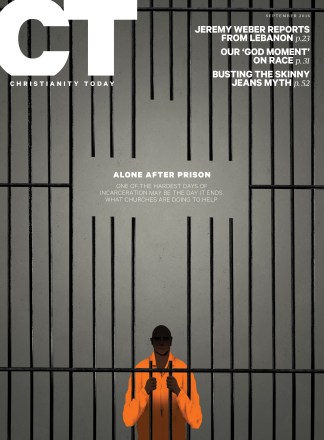Evangelicals are sensitive to what we call “God moments”—when circumstances fall together in a way that suggests God is at work in our lives in a fresh way.
Mainstream white evangelicals have experienced collective “God moments.” In the 1970s, few churches concerned themselves with the relief of world hunger. Then Ron Sider wrote Rich Christians in an Age of Hunger, and before long, we just assumed that evangelicals should be concerned about hunger. Before Roe v. Wade, abortion was sidelined as a Catholic concern. But after the advocacy of Francis Schaeffer and others, we quickly saw the great evil that abortion is. These were God moments—times when our Lord graciously gave us moral clarity about an issue he was calling us to engage.
We are currently experiencing a new “God moment,” when God is shining his burning light on how our nation and our churches are fractured by racial division and injustice. In the past two years, we’ve seen image after image of injustice perpetrated against black Americans. We’ve studied the statistics. And most important, we’ve heard the anguished cry of a suffering community that is understandably hurting, angry, and demanding progress.
Moderate white evangelicals, who make up the bulk of our movement, see more clearly than ever how racism is embedded in many aspects of our society, from business to law enforcement to education to church life. We have been slow to hear what the black church has been telling us for a while. And in all that, we hear God calling his church to seek justice and reconciliation in concrete ways.
To be evangelical now means to be no longer deaf to these cries or to God’s call. In 2012, only 13 percent of white evangelicals said they thought about race daily (41% of black evangelicals did so). Today, we’re thinking about race more than daily—due partly to the news cycle, and partly to our rediscovering biblical teaching.
We’ve started to see afresh the vision of nations united at Pentecost (Acts 2), of all the peoples worshiping the Lamb before the throne of God (Rev. 4), of all parts of the body saying to each other, “I have need of you” (1 Cor. 12). We’ve seen again the relevance of Paul’s teaching that Christ has broken down the dividing wall between peoples (Eph. 2–3). We’ve been convicted for neglecting these teachings in ways that have led to subtle and overt acts of racism. We are now struggling to find ways to model what a redeemed, multiethnic and multiracial community looks like before the return of Christ.
Today, we’re thinking about race more than daily—due partly to the news cycle, and partly to our rediscovering biblical teaching.
Yes, we know about the “white evangelicals” talked about in the media—many of whom are unchurched conservative Christians weary of being politically and socially marginalized. They long to make America great again, which unfortunately seems to involve marginalizing those who are not white. They may affirm with us biblical authority, the uniqueness of Christ, and the power of the Cross. But to the extent that they remain deaf about racial injustice and reconciliation as gospel priorities, they do not represent the best of the evangelical tradition.
Our tradition’s record on race has been checkered at best. At the same time, since the Great Awakening, there has been a witness for racial justice and reconciliation. In the last century, Billy Graham started refusing to segregate his crusades in the 1950s. In the 1980s, Promise Keepers made racial reconciliation among men a priority. In 2000, the Southern Baptists, in the Baptist Faith and Message, acknowledged and repudiated their history of racism. But in the past two years, evangelicals have coalesced on this issue on a massive scale. It’s difficult to find a mainstream white evangelical leader or historically white evangelical organization that doesn’t believe that racial justice is now a core concern, alongside abortion, human sexuality, and religious freedom—and that doesn’t believe that the days of all-white evangelical organizations are coming to an end.
This hardly means that the kingdom of heaven has arrived. Far from it. We have a lot to learn about the texture of the racism embedded in our culture and our churches. To say that we have coalesced doesn’t mean that every single evangelical church is fully on board or knows the next steps to take in their context. That said, we thank God for pulling the scales from our eyes and prodding us to more fully love him and our neighbors—all of them—as ourselves.
Mark Galli is editor of Christianity Today.










